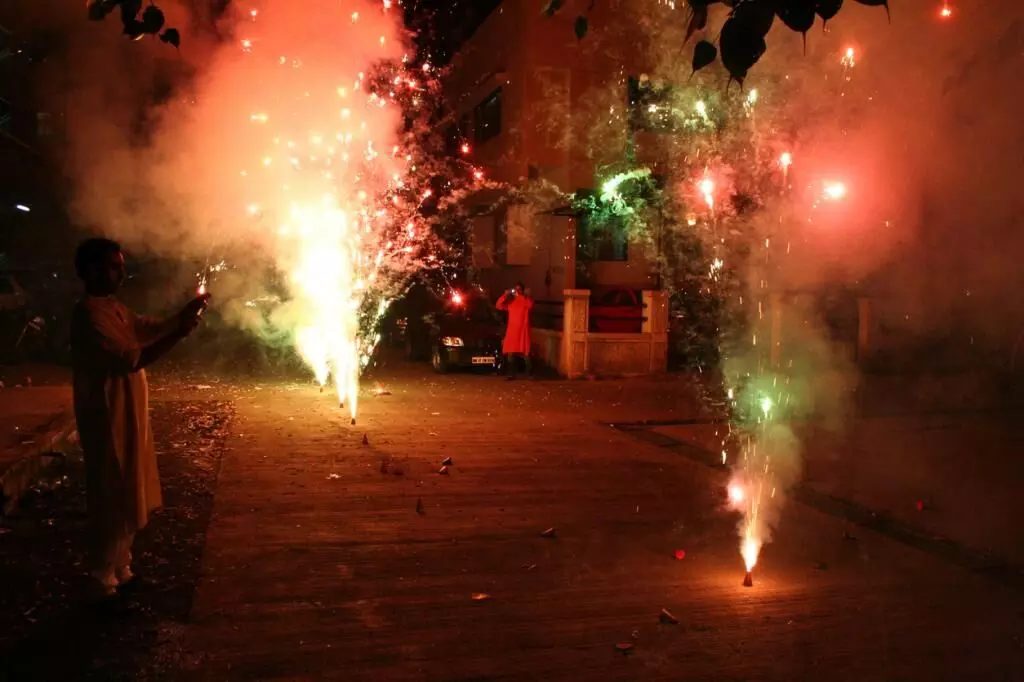A call for conscious celebration

As Diwali, the festival of lights, approaches, millions across India prepare to celebrate with joy and reverence. The charm of new attire, brightly decorated homes, and mouth-watering sweets imbues this time with excitement. Yet, amidst these traditions, the loud, smoky spectacle of firecrackers has grown to be synonymous with Diwali. While they bring a temporary thrill, firecrackers are increasingly casting a shadow on both our health and the environment, and it's time we reevaluate their role in this cherished festival. Firecrackers may seem like harmless fun, yet their potential dangers extend far beyond fleeting entertainment. Unlike cigarette packs that prominently display health warnings, firecrackers rarely reveal the hazardous chemicals hidden within. Beneath their glittery packaging lies a cocktail of charcoal fuel, oxidizers, reducers, and heavy metals like aluminium, copper, and strontium. When ignited, these materials create not just vibrant colours but a dangerous medley of pollutants that linger in the air, unfiltered and inhaled by all.
The health implications are severe. Firecrackers release particulate matter, such as PM2.5, which penetrates deep into the lungs, exacerbating conditions like asthma and bronchitis and leading to acute respiratory issues. Hospitals report increased visits for breathing difficulties during Diwali, with children and elderly individuals often bearing the brunt. Beyond immediate reactions, prolonged exposure to these particles has been linked to chronic respiratory diseases and even cancer. Research consistently shows that firecracker pollution is far more dangerous than regular ambient pollution. A study from Pune’s Research Foundation revealed staggering levels of PM2.5 emissions from firecrackers, with a single “snake” firecracker producing almost 64,500 µg/m³ in minutes—levels well beyond what’s considered safe. This intense concentration inflames the lungs, weakens the immune system, and, according to some studies, releases toxic gases in amounts far exceeding those from cigarettes. Comparisons between firecracker emissions and everyday pollution often understate the reality. Firecrackers contribute uniquely potent, short-term bursts of pollution that infiltrate the atmosphere at rates few other sources can match. India, with 13 of the world’s 20 most polluted cities, is particularly vulnerable, as are the countless individuals living in urban areas already struggling with high pollution levels. While other pollutants come from necessary aspects of daily life, firecracker pollution is largely avoidable.
Regulations have attempted to address these issues. The Petroleum and Explosives Safety Organization (PESO) has established limits on specific chemicals like sulfur, nitrates, and aluminium, and the Supreme Court has banned materials such as lithium, mercury, and lead in firecrackers. However, other metals, including aluminium and copper, remain present, with minimal labelling requirements to warn users. While cigarettes carry age restrictions and clear health warnings, firecrackers—no less dangerous—are often marketed without these necessary cautions, even to children. Diwali embodies values of hope, light, and harmony with nature. As we reflect on the festival’s deeper meanings, we can make a conscious choice to embrace traditions that do not harm our health or environment. With every burst of light, let’s focus on honouring nature, as traditional Diwali prayers do, and minimize pollution’s grip on our lives. In doing so, we help protect not only our lungs but also the beauty of the air, land, and water that sustains us. This Diwali, let’s redefine celebration as a way of nurturing our well-being and our planet. If we can celebrate responsibly, we can secure a brighter future for generations to come. As each diya (lamp) symbolizes light over darkness, let it also remind us of our role in protecting our environment. By saying no to firecrackers, we can create a healthier, safer Diwali for our families and our communities, truly honouring the spirit of this sacred and beautiful festival!



